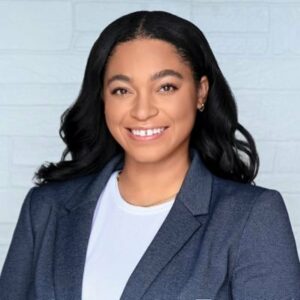To Be Seen: A Narrative on the SGO LEAD Experience | Kelsea R. Grant, MD
 Residency is a challenging time for OB/GYN trainees across the country. For me, it was a period of suppressed confidence, persistent insecurity and stifling anxiety. These feelings led me to shy away from the parts of medicine that once brought me the most fulfilment. As I reflect on my journey and prepare for the next phase of my career, I can’t help but realize that in many ways, I’ve become a shell of who I once used to be. Regardless of these feelings and my imposter syndrome, my desire and drive to pursue a career in gynecologic oncology has never waned.
Residency is a challenging time for OB/GYN trainees across the country. For me, it was a period of suppressed confidence, persistent insecurity and stifling anxiety. These feelings led me to shy away from the parts of medicine that once brought me the most fulfilment. As I reflect on my journey and prepare for the next phase of my career, I can’t help but realize that in many ways, I’ve become a shell of who I once used to be. Regardless of these feelings and my imposter syndrome, my desire and drive to pursue a career in gynecologic oncology has never waned.
As a Black woman in medicine, I am no stranger to being the only one or one of the few. I am painfully aware of how isolating it can feel and how it feels to be tokenized in predominantly white spaces. It is often difficult to find a true sense of belonging when few share your background. As such, I have advocated for spaces that have formed community for me and trainees who look like me at every level of my training. When a mentor from my institution shared this opportunity to apply to be a mentee in the LEAD (Leadership, Engagement, And Action in Diversity) Program, I was pleased to find that the Society of Gynecologic Oncology (SGO) had placed such value on initiatives that are so intentional in diversifying this field—for the benefit of the workforce and most importantly, our patients. Programs like LEAD are essential because they help level the playing field by creating opportunities that reflect the talent and potential for those of us that are often overlooked due to systemic inequities.
The SGO LEAD Program was advertised as a longitudinal mentorship program for trainees interested in gynecologic oncology and who are underrepresented in medicine. I had read the description on the website and watched the promotional video; however, I had no idea that it would help fundamentally and radically change my confidence and sense of belonging in this field. With monthly sessions, we met with distinguished fellows and attendings from across the country who shared their journeys, their triumphs, and their losses. We worked on our CVs, personal statements, and received feedback on ongoing research endeavors. We forged individual relationships with our assigned mentors who were our editors, confidants, and cheerleaders. These mentors so graciously volunteered and invested their time into us. Their roles were not to evaluate us nor to supervise us. They solely embraced this role to mentor us because of their belief in the importance of diversifying our workforce. The importance of that kind of intentional mentorship cannot be overstated.
The LEAD program concluded with the LEAD summit, an in-person workshop that coalesced the many lessons we had learned throughout our monthly sessions. We discussed what it meant to traverse this field as someone “from the margins.” We discussed the importance of community and mentorship development as tools for tackling imposter syndrome. We were humbled as we listened to the experiences and work of patient advocates, who reminded us of why we all chose to do this work. We presented and celebrated research. In that room, we built a sense of community and friendship amongst other mentees who had similar experiences and struggles and so much more.
How powerful it is to be surrounded and enveloped by generations of people who pursued the same professional endeavors and are doing the work with grace and purpose.
It’s even more powerful that those same individuals believe in you. They see your potential and they welcome you one day joining the profession and further cultivating the field that we all find so rewarding. I do not know how to find the words that describe the feeling of being individually affirmed and validated–to be seen.
I am not naïve enough to think that my challenges with anxiety, confidence and imposter syndrome will magically disappear with my experiences in this program. I will likely face them for the rest of my career, but they do not define me or my potential. I am gracefully learning to cope with these feelings. Through LEAD, I’ve gained tools, mentorship, and a sense of belonging that have helped me face those challenges with greater clarity and confidence. And I feel more motivated than ever to pursue and embrace a fulfilling career as a gynecologic oncologist.
The future of gynecologic oncology is bright. My future is bright.
Kelsea R. Grant, MD, is an OB/GYN Resident Physician in the Bronx, NY and an aspiring gynecologic oncologist. These views are her own, and do not represent that of her associated institutions.
About the SGO LEAD 2.0 Program
“The Leadership, Engagement, and Action in Diversity (LEAD) Program is a six-month mentored pathway opportunity created by the SGO Committee on Diversity, Inclusion and Health Equity (DIHE). In its second year, the LEAD 2.0 program offers Underrepresented in Medicine (URiM) trainees sponsorship, resources, and a network to support their development as future gynecologic oncologists.
This initiative is fully dedicated to formalizing, improving, and strengthening the pathway of URiM trainees in preparation for a successful match to gynecologic oncology fellowship, with the express goal of building a workforce that reflects the diversity of our patients.“